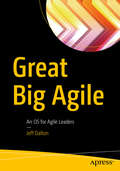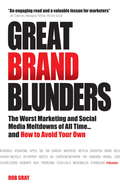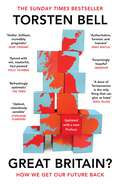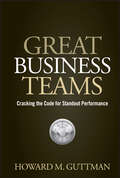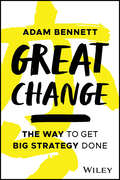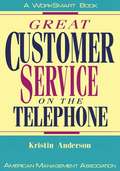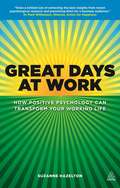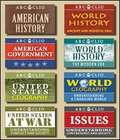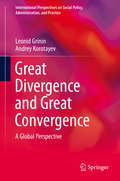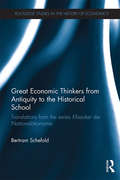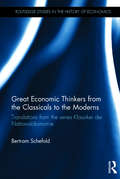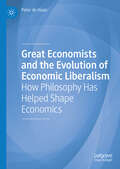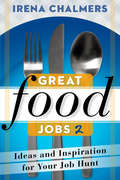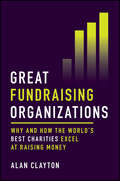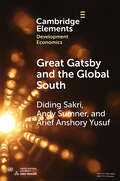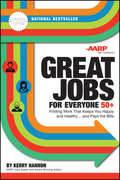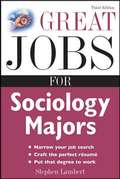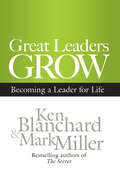- Table View
- List View
Great Big Agile: An OS for Agile Leaders
by Jeff DaltonBig Agile leaders need an empirical, "high-trust" model that provides guidance for scaling and sustaining agility and capability throughout a modern technology organization. This book presents the Agile Performance Holarchy (APH)—a "how-ability" model that provides agile leaders and teams with an operating system to build, evaluate, and sustain great agile habits and behaviors. The APH is an organizational operating system based on a set of interdependent, self-organizing circles, or holons, that reflect the empirical, object-oriented nature of agility. As more companies seek the benefits of Agile within and beyond IT, agile leaders need to build and sustain capability while scaling agility—no easy task—and they need to succeed without introducing unnecessary process and overhead. The APH is drawn from lessons learned while observing and assessing hundreds of agile companies and teams. It is not a process or a hierarchy, but a holarchy, a series of performance circles with embedded and interdependent holons that reflect the behaviors of high-performing agile organizations. Great Big Agile provides implementation guidance in the areas of leadership, values, teaming, visioning, governing, building, supporting, and engaging within an all-agile organization. What You’ll Learn Model the behaviors of a high-performance agile organizationBenefit from lessons learned by other organizations that have succeeded with Big AgileAssess your level of agility with the Agile Performance HolarchyApply the APH model to your businessUnderstand the APH performance circles, holons, objectives, and actionsObtain certification for your company, organization, or agency Who This Book Is For Professionals leading, or seeking to lead, an agile organization who wish to use an innovative model to raise their organization's agile performance from one level to the next, all the way to mastery
Great Brand Blunders: The Worst Marketing and Social Media Meltdowns of All Time...and How to Avoid Your Own
by Rob GrayWhat causes some marketing campaigns to go spectacularly wrong? Why might new product launches, publicity stunts or rebranding exercises be doomed to failure? How can you prevent a social media backlash spiralling out of control? When should you apologise, cut your losses, make a U-turn? Great Brand Blunders takes an informed and at times acerbic look at the worst marketing and social media disasters of all time - and treats them as an amazing learning opportunity. The first book for several years to examine brand failures - and the first with a special focus on social media - Great Brand Blunders offers a mix of entertaining commentary and authoritative advice, and features several first-hand interviews with those involved. A fascinating roll-call of over 150 A-list brands in sticky situations, the book will be required reading not only for professional marketers, academics and students, but for anyone interested in the gritty stories and testing challenges that lie behind the polished brand images marketers hope to present to the public. From awful advertising to ridiculous brand extensions, via misguided sales promotions and ill-conceived social media activity, Great Brand Blunders pulls no punches, putting rash decisions under the microscope and offering advice on how to avoid landing in the same foul mess yourself.
Great Brand Blunders: The Worst Marketing and Social Media Meltdowns of All Time...and How to Avoid Your Own
by Rob GrayWhat causes some marketing campaigns to go spectacularly wrong? Why might new product launches, publicity stunts or rebranding exercises be doomed to failure? How can you prevent a social media backlash spiralling out of control? When should you apologise, cut your losses, make a U-turn? Great Brand Blunders takes an informed and at times acerbic look at the worst marketing and social media disasters of all time - and treats them as an amazing learning opportunity. The first book for several years to examine brand failures - and the first with a special focus on social media - Great Brand Blunders offers a mix of entertaining commentary and authoritative advice, and features several first-hand interviews with those involved. A fascinating roll-call of over 150 A-list brands in sticky situations, the book will be required reading not only for professional marketers, academics and students, but for anyone interested in the gritty stories and testing challenges that lie behind the polished brand images marketers hope to present to the public. From awful advertising to ridiculous brand extensions, via misguided sales promotions and ill-conceived social media activity, Great Brand Blunders pulls no punches, putting rash decisions under the microscope and offering advice on how to avoid landing in the same foul mess yourself.
Great Britain?: The must-read Sunday Times bestseller on How We Get Our Future Back
by Torsten BellTHE SUNDAY TIMES BESTSELLERAn essential blueprint for a better future, from the leading economist and Labour rising star‘Stellar: brilliant, incredibly pragmatic’ Rory Stewart‘Refreshingly optimistic’ The Times‘No one has done more to re-inject sanity into our national policy’ Emily MaitlisThere are few who are better placed to investigate Britain’s plight than Torsten Bell, Labour MP for Swansea West and former Chief Executive of the Resolution Foundation.In Great Britain? he offers both a clear-eyed diagnosis of the problems facing our country – a uniquely toxic combination of huge inequality and stagnant economic growth – and a bold vision for the alternative.In this treasure trove of enlightening and original analysis, Torsten Bell argues that our era of chaos and cynicism needs neither utopianism nor nostalgia, but a practical patriotism to raise living standards and create a more equal country. This is a book bursting with ideas and infectious hope: Bell passionately points us towards a Britain that we can actually build – a future worth fighting for.‘A roadmap to the new normal’ Observer'Pretty cool' Alastair Campbell‘A dose of Torstenomics is the only thing that can give us hope’ Amol Rajan‘Spiced with wit, masterful, fact-packed’ Polly Toynbee*Updated with a new Preface*
Great Bubbles, vol 1: Reactions to the South Sea Bubble, the Mississippi Scheme and the Tulip Mania Affair
by Ross B EmmettPeriods of euphoria followed by sudden crashes are a familiar phenomenon in economics. Such events have become known as "bubbles". These volumes bring together writings on such phenomena - with works centering upon some of the more colourful examples.
Great Bubbles, vol 2: Reactions to the South Sea Bubble, the Mississippi Scheme and the Tulip Mania Affair
by Ross B EmmettPeriods of euphoria followed by sudden crashes are a familiar phenomenon in economics. Such events have become known as "bubbles". These volumes bring together writings on such phenomena - with works centering upon some of the more colourful examples.
Great Bubbles, vol 3: Reactions to the South Sea Bubble, the Mississippi Scheme and the Tulip Mania Affair
by Ross B EmmettPeriods of euphoria followed by sudden crashes are a familiar phenomenon in economics. Such events have become known as "bubbles". These volumes bring together writings on such phenomena - with works centering upon some of the more colourful examples.
Great Business Teams: Cracking the Code for Standout Performance
by Howard M. GuttmanUnderstand and decode the inner workings of great business teams with the more than 30 in-depth examples in Great Business Teams: Cracking the Code for Standout Performance. Author Howard Guttman examines and dissects teams at top-management, business-unit, and functional levels and isolates five key factors that drive team performance to offer you insight into the ways these teams achieve success. Using this book, go directly to the marketplace to scrutinize teams in a variety of industries, evaluating the challenges they face and the methods they choose to manage these challenges.
Great Change: The WAY to Get Big Strategy Done
by Adam BennettRethink what you know about THE WAY your business works: learn how to implement strategy and drive real, measurable change in your organisation Are you tired of developing strategies that aren’t properly implemented? Do you want to overcome disruption and create positive change in your organisation? Great Change: The WAY to Get Big Strategy Done is the book that will show you how to turn your plans into reality. Author and experienced leader Adam Bennett shares a unique, engaging approach to organisational transformation that will kindle your motivation and ignite your ingenuity. Great Change combines the philosophy of the Tao Te Ching and Japanese martial arts with real-world stories to deliver a practical, 5-step process for success. You’ll discover the mindset and the actions that will ensure your strategy creates real, measurable results. In all organisations, there is a WAY of doing things. These methods, approaches, and cultures combine in a manner that defines the very core of that organisation. Think about it: You know intuitively “the way” that your current organisation works, what it stands for, and why it exists. But just as there is a WAY of being, there is a WAY of changing. Great Change shares a 90-day blueprint that unpacks exactly how you can combine the right mentality and mechanics to build momentum and spark transformation. Rethink what you know about THE WAY of being and doing in business Uncover unique and inspiring leadership lessons from philosophy, world history, and big business Develop a mindset for driving action, challenge your own way of thinking about change, and identify the corporate characters who resist it Learn the tried-and-tested methods to accelerate your plans for organisational transformation Discover how to build momentum in a new role — and avoid the common mistakes leaders make in spearheading changeIn today's world of rapid evolution, uncertainty, and always-on media, organisations need to adapt quickly and effectively to stay competitive. They need to sense what is happening in the world and to strategise. But that is not enough. They need to know how to actually get that strategy done. Great Change reveals the tools, skills, and methodologies any leader, executive, or manager can use to deliver successful results, even in the most challenging times.
Great Crash Of 2008
by Ross Garnaut David Llewellyn-SmithAs the world enjoyed the prosperity of an unparalleled boom, an economic earthquake was looming, and then struck abruptly. Bastions of finance collapsed, long-standing policy beliefs were abandoned, and governments charged into the rubble without time to watch their steps. But for those who were looking, the faultlines that ran beneath the boom had been apparent for years. In The Great Crash of 2008, Ross Garnaut and David Llewellyn-Smith take us through the imbalances that led to the global financial crisis, tracing the cracks that were appearing within the modern economy and presenting a whole-world view of reasons for the downturn. They assess the implications of the global financial crisis and offer hope for finding order in the wreckage, in restoring development and building a stronger and more sustainable world.
Great Customer Service on the Telephone (The\worksmart Ser.)
by Kristin AndersonFirst impressions are often lasting impressions. How customers are treated on the phone can quickly turn them into either an ex-customer or a customer for life. This thorough, quick-reading guide shows anyone who uses the phone -- from salesperson to manager to secretary -- how to treat it as a service tool that directly impacts on company profits. Readers will be able to double their effectiveness when they learn how to:* handle irate customers* end those ""endless"" calls* take meaningful messages* handle conference calls and transfer calls* screen calls and ask focused questions* use the phone during emergencies* improve their voice effectivenessWith worksheets, checklists, and fill-in forms, this desktop primer will inspire fabulous phone service.
Great Days at Work
by Suzanne HazeltonGreat Days at Work will enable you to become more enthusiastic at work, feel more positive and work more effectively with others. Drawing on the latest insights from positive psychology, it outlines practical day-to-day changes you can make immediately for instant benefit, as well as helping you develop a longer term version that means you'll get more out of work. The book is based on a three-layered framework, with the first layer focusing on the mindset for change, the second on personal responsibility, and the third on vision and choice. It reveals how to use these layers to develop an effective perspective on time, embed productive new habits, gain a clear sense of self and work better with others. As a result you will make a bigger contribution to your organization, as well as feeling more engaged, satisfied and in control of your own work and career. Discover how to have a great day at work, every day!
Great Depression: Causes and Impact (Abridged)
by Thomas K. MccrawProvides a vehicle for discussing the problems caused by the Great Depression.
Great Depression: People and Perspectives
by Hamilton CravensThis reference for general readers and students in high school and up gives voice to American men, women, and children from a range of economic classes and ethnic backgrounds during the Great Depression. Some areas explored are coming of age in the 1930s, medicine and the family, scripts of racial segregation in New Deal America, American technology in the 1930s, and the conflict between social scientists and policymakers responding to the crisis. A section of about 20 pages of one- to two-page excerpts from primary source documents details the experiences of everyday Americans through excerpts from news articles, diaries, letters, and b&w historical photographs. A glossary of terms, key figures and events, and concepts is included. Topics in the series are selected to fit curricular standards for both high school history classes and undergraduate American history courses. An emphasis on social history brings historical analysis into the classroom, while still focusing on topics that will engage students. Cravens is Professor of History at Iowa State University
Great Divergence and Great Convergence
by Leonid Grinin Andrey KorotayevThis new monograph provides a stimulating new take on hotly contested topics in world modernization and the globalizing economy. It begins by situating what is called the Great Divergence--the social/technological revolution that led European nations to outpace the early dominance of Asia--in historical context over centuries. This is contrasted with an equally powerful Great Convergence, the recent economic and technological expansion taking place in Third World nations and characterized by narrowing inequity among nations. They are seen here as two phases of an inevitable global process, centuries in the making, with the potential for both positive and negative results. This sophisticated presentation examines: Why the developing world is growing more rapidly than the developed world. How this development began occurring under the Western world's radar. How former colonies of major powers grew to drive the world's economy. Why so many Western economists have been slow to recognize the Great Convergence. The increasing risk of geopolitical instability. Why the world is likely to find itself without an absolute leader after the end of the American hegemony A work of rare scope, Great Divergence and Great Convergence gives sociologists, global economists, demographers, and global historians a deeper understanding of the broader movement of social and economic history, combined with a long view of history as it is currently being made; it also offers some thrilling forecasts for global development in the forthcoming decades.
Great Economic Thinkers from Antiquity to the Historical School: Translations from the series Klassiker der Nationalökonomie (Routledge Studies in the History of Economics)
by Bertram SchefoldThis book contains commentaries from the series "Klassiker der Nationalökonomie" (classics of economics), which have been translated into English for the first time. This selection focuses on neglected, but notable writers in a deserted sub-discipline, localising the beginning of economic science not with Adam Smith, but with the moral question of usury and the good life in Antiquity. Bertram Schefold’s choice of authors for the "Klassiker" series, which he has edited since 1991, and his comments on the various re-edited works are proof of his highly original and thought-provoking interpretation of the history of economic thought (HET). This volume is an important contribution to HET not only because it delivers original and fresh insights about such well-known figures as Aristotle, Jevons or Wicksell, but also because it deals with authors and ideas who have been forgotten or neglected in the previous literature. In this regard Schefold’s book could prove to be seminal for the field of the history of economic thought, for in the age of globalisation our usual restriction to the thinkers of Western Europe and the USA might eventually be overcome. This book will give the reader a far broader view of economics compared to that of the latest research. This volume is suitable for those who are interested in and study history of economic thought as well as economic theory and philosophy.
Great Economic Thinkers from the Classicals to the Moderns: Translations from the series Klassiker der Nationalökonomie (Routledge Studies in the History of Economics)
by Bertram SchefoldThis is the opus magnum of one of the world’s most renowned experts on the history of economic thought, Bertram Schefold. It contains commentaries from the series Klassiker der Nationalökonomie (Classics of Economics), which have been translated into English for the first time. Schefold’s choices of authors for this series, which he has edited since 1991, and his comments on the various re-edited works, are proof of his highly original and thought-provoking interpretation of the history of economic thought. Together with a companion volume, Great Economic Thinkers from Antiquity to the Historical School: Translations from the series Klassiker der Nationalökonomie, this book is a collection of English translations with introductions by Bertram Schefold. The emphasis of this volume is on the theoretical debates, from the theory of value to imperfect completion; from money to the institutional framework of society; and from the history of economic thought to pioneering works in mathematical economics. This volume is an important contribution to the history of economic thought, not only because it delivers original and fresh insights about well-known figures, such as Marx, Stackelberg, Sraffa, Samuelson, Tooke, Hilferding, Schmoller and Chayanov, but also because it deals with ideas and authors who have been forgotten or neglected in previous literature. This volume is of great interest to those who study the history of economic thought, economic theory and philosophy, as well as those who enjoyed the author’s previous volume, Great Economic Thinkers from Antiquity to the Historical School.
Great Economists and the Evolution of Economic Liberalism: How Philosophy Has Helped Shape Economics
by Peter de HaanThis book explores the broad range of intellectual influences, ranging from the history of economic thought to political philosophy, that have shaped economics and its leading thinkers. It examines the relationship between economics and philosophy, in particular how liberalism has helped define economics since the days of Adam Smith. The entire history of economics, from Adam Smith to Thomas Piketty, is charted to highlight how economics has engaged with the political and philosophical ideas of the time. Particular attention is given to the ideas of Karl Polanyi, John Maynard Keynes, Friedrich Hayek, Milton Friedman, Paul Samuelson, Amartya Sen, Mariana Mazzucato and Thomas Piketty. This book offers unique insight into the development of economics over several centuries. It will, in particular, be relevant to students and researchers interested in the history of economic thought and the political economy.
Great Food Jobs 2: Ideas and Inspiration for Your Job Hunt
by Irena ChalmersGreat Food Jobs 2: Ideas and Inspirations for Your Job Hunt, ?winner of the the 2013 Gourmand Special Award of the Jury, is an almanac of eminently useful career guidance mixed with tasty bites of utterly useless gastronomical nonsense, including weird sushi combinations and odd names of bakeries such as “Nice Buns.” A companion to the award-winning Food Jobs: 150 Great Jobs for Culinary Students, Career Changers and Food Lovers, this second volume describes an abundance of careers in the food industry in and out of the kitchen. In an era of ‘txt msgs,’ Chalmers’ Great Food Jobs 2 is refreshingly erudite, urbane, wry, witty,and consummately British. This sparkling, extraordinary compendium will astonish and amuse, inform and make you laugh out loud!
Great Fundraising Organizations: Why and How The World's Best Charities Excel at Raising Money
by Alan ClaytonUnlock new growth opportunities by transforming your organization's approach to fundraising In Great Fundraising Organizations, renowned nonprofit consultant Alan Clayton delivers a proven blueprint for charities and non-profits worldwide to scale their fundraising efforts and their effectiveness. Based on data gathered over twenty years of work with more than 500 organizations including Unicef and WWF, this book explains exactly what works and why, revealing to readers the rigorously researched mindsets, strategies, and practices in use by Great Fundraising Organizations (GFOs)—rare organizations that have the ability to unlock the fundraising revenue they need to meet or exceed performance and mission goals. Accessible, confident, and infused with Clayton's signature style of observational humor, this book delivers everything readers need to fundraise more effectively with certainty, clarity, and confidence. Some of the ideas explored by Clayton include: Evidence to explain why some non-profits dramatically grow their revenues whilst others don't. What makes leadership for a Great Fundraising Organization different. That a precise set of internal behaviours are more important in driving growth than external factors. Why some fundraising communications drive growth and why some don't. Great Fundraising Organizations earns a well-deserved spot on the bookshelves of nonprofit CEOs, directors of fundraising, board chairs and members, and all fundraising professionals seeking to apply tried-and-tested methods for fundraising success and growth to their organizations.
Great Gatsby and the Global South: Intergenerational Mobility, Income Inequality, and Development (Elements in Development Economics)
by Andy Sumner Diding Sakri Arief Anshory YusufIn the Global South economic mobility across generations or intergenerational economic mobility is in and of itself an important topic for research with consequences for policy. It concerns the 'stickiness' or otherwise of inequality because mobility is concerned with the extent to which children's economic outcomes are dependent on their parents' economic outcomes. Scholars have estimated levels of intergenerational mobility in many developed countries. Fewer estimates are available for developing countries, where mobility matters more due to starker differences in living standards. This Element surveys the area, conceptually and empirically; it presents a new estimate for a developing country, namely Indonesia; it discusses the 'Great Gatsby Curve' and highlights the different positions of developed and developing countries. Finally, it presents a theoretical framework to explain the drivers of mobility and the stickiness or otherwise of inequality across time. This title is also available as Open Access on Cambridge Core.
Great Jobs for Everyone 50 +, Updated Edition: Finding Work That Keeps You Happy and Healthy...and Pays the Bills
by Kerry HannonYou can find profitable, fulfilling work after 50! Kerry Hannon's national bestseller, Great Jobs for Everyone 50+, has become the job-hunting bible for people in their forties, fifties, and beyond. With her no-nonsense style, Hannon shows where the opportunities are and how to get them. In this completely revised edition, Hannon offers twice as many jobs and brand-new material to market your skills in today’s job market, with expert tips on revamping a résumé, networking, interviewing like a pro, building a social media platform to stand out in the crowd, and much more. Whether you took early retirement, were laid off, are seeking a job that you will love, need supplemental income, or want to stay engaged and make a difference by giving back with your talents, Hannon’s book is an essential tool. The truth is that many companies are looking for candidates with your experience, expertise, and maturity. The trick is finding those employers—and going into your search with a positive attitude and realistic expectations. This completely updated Great Jobs shows you how to avoid common job-seeking mistakes and helps you find your ideal employment in today’s landscape.
Great Jobs for Sociology Majors (Third Edition)
by Stephen LambertGreat Jobs books help students and recent college graduates explore the possibilities in their majors and provides guidance on how to present a major as a workplace asset during an interview.
Great Leaders Grow: Becoming a Leader for Life
by Ken Blanchard Mark MillerSuccessful leaders don’t rest on their laurels because leadership is not a title on a business card. Leadership is a living process—and life means growth. As Ken Blanchard and Mark Miller write in the introduction, “the path to increased influence, impact, and leadership effectiveness is paved with personal growth.… Our capacity to grow determines our capacity to lead. It’s really that simple.” Great Leaders Grow shows leaders and aspiring leaders precisely which areas to focus on so they can remain effective throughout their lives. Debbie Brewster—the protagonist from Blanchard and Miller’s international bestseller The Secret—returns in this book to mentor her mentor’s son, Blake, as he begins his career. Now an accomplished leader herself, Debbie shows Blake how growing as a leader and as a human being are inextricably linked. “How well you and I serve will be determined by the decision to grow or not,” she says. “Will you be a leader who is always ready to face the next challenge? Or will you be a leader who tries to apply yesterday’s solutions to today’s problems?” As Blake confronts the challenges of business in the real world, he turns to Debbie for guidance. Step by step, Debbie and Blake explore the GROW model—four ways that leaders must challenge and stretch themselves, both on the job and off, to fulfill their highest potential. Whether you’re a CEO or an entry-level employee, this book will inspire you to reflect on your life and design your own long-term growth plan—a plan that can lead not only to continuing professional success but to personal fulfillment as well.
